Lithuania: a difficult path to and from Russia
Accession of Courland and Lithuania
However, formally maintaining liable obligations to Poland, the Duchy of Courland, also since the end of the Northern War, has been in the sphere of influence of Russia. Back in 1710, Anna - the daughter of the Russian Tsar John V, brother of Peter I, became the Duchess of Courland through marriage with the Duke Frederick William Kettler. In 1730, Anna Ivanovna ascended the Russian throne. The power of the Biron dynasty reigned in Kurland. In 1737, Ernst-Johann Biron became the duke - the closest ally and favorite of Anna Ivanovna, later transferring the reigns to the duchy to his son. Since then, the Russian Empire has actually provided full support to the Dukes of Courland, protecting their power from encroachments from the disaffected part of the local nobility. The inclusion of the Duchy of Courland into Russia was voluntary - the aristocratic surnames of the duchy, fearing the destabilization of the system in Kurland after the invasion of 1794 by the troops of Tadeusz Kosciuszko, a Polish general who was inspired by the ideas of the French Revolution, turned to Russia for military help. Commanded the suppression of the Polish detachments himself Alexander Vasilyevich Suvorov. After the suppression of the uprising, the Courland nobility turned to the Russian empress with a request to include the duchy in the empire. In the place of the Duchy of Courland, the province of the same name was formed, and the local aristocracy largely retained its position. Moreover, the Courland and Livonian German nobility became one of the most prominent groups of the Russian nobility, playing a huge role in the political life of the Russian empire until the beginning of the twentieth century.
But even more important than the adoption of Courland, for the Russian Empire was the annexation of the lands of the Grand Duchy of Lithuania. And not only in the strategic and economic terms, but also in terms of the preservation of the Russian language and the Orthodox faith in the lands formerly under the authority of the principality. Indeed, besides Lithuania itself, the Grand Duchy included vast territories of modern Ukraine and Belarus with the Russian population (at that time there was no artificial separation of the Russian people), most of them professing Orthodoxy. For centuries, the Orthodox population of the Grand Duchy of Lithuania, subjected to oppression by the Catholic gentry, appealed for help to the Russian state. The inclusion of the Grand Duchy of Lithuania into Russia largely resolved the problem of discrimination of the Russian and Orthodox population by the Catholic gentry. Actually, the Lithuanian part of the Grand Duchy, that is, its Baltic lands, became part of the Vilna and Kovno provinces of the Russian Empire. The population of the provinces were not only Lithuanians, who were mostly peasants who lived in farms, but also Germans and Jews, who made up the majority of the urban population, and Poles, who were competing for Lithuanians in agriculture.
Anti-Russian uprisings - attempts to revive the Rzeczpospolita
The Lithuanian nobility and peasantry, in contrast to the Baltic Germans, turned out to be less loyal to the Russian Empire. Although at first the Lithuanian population did not show its protest activity, but it cost in 1830-1831. flared up the first Polish uprising, as the unrest began in Lithuania. The uprising against the Russian authorities acquired the character of real hostilities, covering not only the territory of Poland, but also of Lithuania and Volyn. The rebels seized the territory of practically the entire Vilna province, except for the city of Vilna itself and several other large cities. The insurgents achieved sympathy from the nobility and the peasantry, declaring the restoration of the Statute 1588 of the Grand Duchy of Lithuania, which guaranteed the rights and freedoms to the population.
It should be noted that during the uprising 1830-1831. the actions of the Lithuanian rebels created significant obstacles to the actions of the Russian troops in suppressing unrest in Poland. Therefore, on the territory of Vilna province in 20 in April 1831, a punitive operation was launched under the general leadership of General Matthew Hrapovitsky - the Vilna governor and Grodno governor. By May 1831, control was restored over virtually the entire territory of Vilna province. However, the relative order in the Vilna province was established only for three decades. In 1863-1864 the next Polish uprising broke out, no less large-scale and bloody than the 1830-1831 uprising. The uprising was organized by an extensive network of Polish gentry organizations led by Yaroslav Dombrovsky. The activities of the Central National Committee extended not only to the Polish, but also to the Lithuanian and Belarusian lands. In Lithuania and Belarus the committee was headed by Konstantin Kalinovsky. The uprising against the Russian government in Poland, Lithuania and Belarus was actively supported from abroad. Foreign volunteers from European countries flocked to the ranks of the Polish insurgents, who considered it their duty to "fight the tyranny of the Russian empire." In Belarus, the Catholic gentry, who formed the backbone of the insurgent movement, unleashed terror against the Orthodox peasantry, who did not support the rebellion alien to his interests. The victims of the rebels were at least two thousand people (according to the Brockhaus and Efron Encyclopedic Dictionary).
Belarusian historian Yevgeny Novik believes that in many respects story Polish uprising 1863-1864's. It was falsified, not only by Polish researchers, but also by Soviet authors (http://www.imperiya.by/aac25-15160.html). In the USSR, the uprising was considered solely through the prism of its national liberation character, on the basis of which its progressive nature was recognized. At the same time, it was forgotten that the actual uprising was not a popular one. The overwhelming majority of its participants were represented by the Polish and Lithuanian gentry, the peasantry made up no more than 20-30% in the West Belarusian lands and no more than 5% in Eastern Belorussia. This was explained by the fact that most of the peasants spoke Russian and professed Orthodoxy, and the uprising was raised by representatives of the Polish and Polonized gentry who professed Catholicism. That is, in the ethnic sense they were alien to the Belarusian population, and this explained the insignificant nature of the support of the uprising by the peasantry. The fact that the peasants supported the Russian Empire in this confrontation was recognized in their reports by army and gendarme chiefs, who were directly involved in establishing order in the Lithuanian and Belarusian provinces.
When in the Dinaburg district the Old Believers peasants captured a whole detachment of rebels, the head officer of the Vilnius gendarmerie A.M. Losev wrote in a memorandum: “The Dinaburg peasants proved where the strength of the Government is - in the mass of the people. Why not use this force everywhere and thereby declare before Europe the present position of our western region? ”(Uprising in Lithuania and Belarus 1863-1864 M., 1965. S. 104). For the Belarusian peasantry, the return of the Polish-Lithuanian Commonwealth did not carry anything good except a rollback to the terrible times of persecution of the Russian language and the Orthodox faith. Therefore, if the uprising was of a national liberation nature, it was only for polonized groups of the population and, above all, for the Catholic gentry, who nostalgic for the times of Rzecz Pospolita and the rights that it enjoyed in the Polish-Lithuanian unitary state.
The tsarist government dealt with the insurgent Poles and Lithuanians extremely humanely. Only 128 people were executed, 8-12 thousand people went into exile. Repressions affected, as a rule, leaders, organizers and real participants of insurgent terror. However, in addition to court sentences, there were also administrative measures. After the uprising, a ban was introduced on the official use of the names of Poland and Lithuania, all Catholic monasteries and parish schools were closed. In the Vilna province, schooling in the Lithuanian language was completely prohibited; in the Kovno province, it was retained only for elementary school. All books and newspapers written in the Lithuanian language by the Latin alphabet were withdrawn, respectively, and a ban was introduced on the use of the Lithuanian Latin alphabet. Through these measures, the tsarist government sought to prevent the preservation and spread of anti-Russian sentiment among the Polish and Lithuanian population, and in the future - to Russify it, integrate Poles and Lithuanians into the Russian nation by affirming the rejection of the Latin alphabet, national languages and a gradual transition to the Orthodox faith.
However, anti-Russian sentiment persisted in Lithuania. This, in many respects, was facilitated by the activity of the Catholic Church and Western states. So, from the territory of East Prussia to Lithuania, smuggled Lithuanian literature printed in Latin in the printing houses of East Prussia and in the United States of America. The delivery of prohibited books was done by a special subspecies of smugglers - the bookseller. As for the Catholic clergy, it created underground schools at parishes, where they taught the Lithuanian language and the Latin alphabet. In addition to the Lithuanian language, which the native Lithuanians certainly had every right to master, anti-Russian, anti-imperial sentiments were also cultivated in the underground schools. Naturally, this activity was supported by both the Vatican and the Polish Catholic hierarchs.
The beginning of a short independence
In Lithuanian professing Catholicism, who negatively perceived their presence under the rule of the Russian Empire, anti-Russian forces in Europe saw natural allies. On the other hand, the Lithuanian population was indeed discriminated against by the short-sighted policy of the royal authorities, who prohibited the use of the national language, which promoted the spread of radical sentiment among the most diverse sections of the population. In the years of the revolution 1905-1907. powerful performances took place in the Vilna and Kovno provinces, both of the revolutionary workers and the peasants.
During World War I, in 1915, the Vilno gubernia was occupied by German troops. When Germany and Austria-Hungary decided to create puppet states on the territory of the western regions of the former Russian empire, on February 16 in Vilna, Vilna announced the re-establishment of a sovereign Lithuanian state. 1918 July 11 was proclaimed the creation of the Kingdom of Lithuania, whose throne was to be taken by the German prince Wilhelm von Urach. However, in early November, the Council of Lithuania (Lithuanian Tariba) decided to abandon plans to create a monarchy. 1918 December 16, after the withdrawal of the occupying German troops, the Lithuanian Soviet Republic was established, and 1918 February 27 announced the creation of the Lithuanian-Belarusian Soviet Socialist Republic. In February-March 1919 began fighting against the Soviet troops, the troops of the Lithuanian Tariba in alliance with the German units, and then with the army of Poland. The territory of the Lithuanian-Belarusian Soviet Socialist Republic was occupied by Polish troops. 1919 to 1920 in the territory of Lithuania and Western Belarus there existed Middle Lithuania, later annexed to Poland. Thus, the territory of modern Lithuania is actually divided into two parts. Former Vilna province was relegated to Poland and from 1922 to 1922. was called Vilenskie voivodship. An independent state of Lithuania with the capital in Kaunas existed on the territory of the Kovno province. Antanas Smyatona (1939-1874) was elected the first president of Lithuania. He headed Lithuania at 1944-1919, then taught philosophy at the University of Lithuania in Kaunas for a while. The re-emergence of Smyaton came to power in 1920, as a result of a coup d'état.
Lithuanian twenties and thirties nationalism
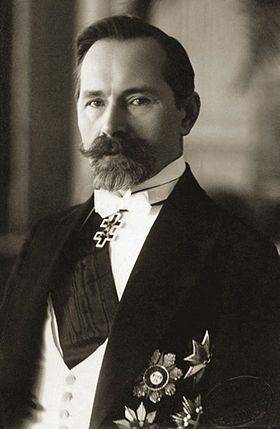 Antanas Smiaton can be distinguished among the founders of modern Lithuanian nationalism. After leaving the presidency in 1920, he did not leave politics. Moreover, Smyaton was extremely dissatisfied with the activities of the center-left government of Lithuania and began to form a nationalist movement. In 1924, the Union of Lithuanian Farmers and the National Progress Party united into the Union of Lithuanian Nationalists (“tautininki”). When the December 17 1926 in Lithuania, there was a coup d'état, led by a group of nationalist officers led by General Povilas Plekhavicius, the Union of Lithuanian Nationalists actually became the ruling party. A few days after the coup, Antanas Smyatona was elected for the second time as President of Lithuania. The ideology of the Union of Lithuanian Nationalists was mixed on a combination of Catholic values, Lithuanian patriotism and peasant traditionalism. The pledge of strength and independence of Lithuania was seen by the party in preserving the traditional way of life. A militarized organization operated under the Union of Nationalists - the Union of Lithuanian shooters. Formed in 1919 year and incorporating many veterans of the First World War, as well as nationalist youth, the Union of Lithuanian shooters became a mass nationalist militia organization and existed until the fall of the Republic of Lithuania in 1940. By the end of 1930's. in the ranks of the Union of Lithuanian shooters consisted up to 60 000 people.
Antanas Smiaton can be distinguished among the founders of modern Lithuanian nationalism. After leaving the presidency in 1920, he did not leave politics. Moreover, Smyaton was extremely dissatisfied with the activities of the center-left government of Lithuania and began to form a nationalist movement. In 1924, the Union of Lithuanian Farmers and the National Progress Party united into the Union of Lithuanian Nationalists (“tautininki”). When the December 17 1926 in Lithuania, there was a coup d'état, led by a group of nationalist officers led by General Povilas Plekhavicius, the Union of Lithuanian Nationalists actually became the ruling party. A few days after the coup, Antanas Smyatona was elected for the second time as President of Lithuania. The ideology of the Union of Lithuanian Nationalists was mixed on a combination of Catholic values, Lithuanian patriotism and peasant traditionalism. The pledge of strength and independence of Lithuania was seen by the party in preserving the traditional way of life. A militarized organization operated under the Union of Nationalists - the Union of Lithuanian shooters. Formed in 1919 year and incorporating many veterans of the First World War, as well as nationalist youth, the Union of Lithuanian shooters became a mass nationalist militia organization and existed until the fall of the Republic of Lithuania in 1940. By the end of 1930's. in the ranks of the Union of Lithuanian shooters consisted up to 60 000 people. The Union of Lithuanian Nationalists initially had a rather positive attitude towards Italian fascism, but later began to condemn some actions of Benito Mussolini, apparently trying to maintain friendly relations with the countries of the West - England and France. On the other hand, the middle of the 1920's. became the period of the emergence in Lithuania of more radical nationalistic organizations. Needless to say, they all had a pronounced anti-Soviet character. In 1927, the Fascist organization “Iron Wolf” appeared, which was in positions of extreme Lithuanian nationalism, anti-Semitism and anti-communism. In political terms, the “iron wolves” were guided by German Nazism in the spirit of the Nazi Party and considered the Union of Lithuanian Nationalists insufficiently radical.
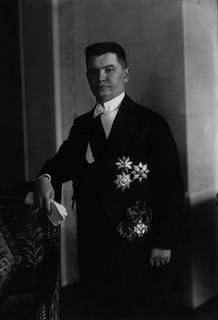 At the head of the Iron Wolf was Augustinus Voldemaras (1883-1942). In 1926-1929 This man, who was, by the way, a professor at the University of Lithuania in Kaunas, served as Prime Minister of Lithuania. Initially, he, together with Antanas Smyatona, created and developed the Union of Lithuanian Nationalists, but later divorced his comrade ideologically, considering his understanding of Lithuanian nationalism insufficiently radical and deep. In 1929, the city of Voldemaras was removed from his post as prime minister and sent under police supervision in Zarasai. Despite the failure, Voldemaras did not leave plans to change the policy of Kaunas. In 1934, he attempted a coup d'état by the Iron Wolves, after which he was arrested and sentenced to twelve years in prison. In 1938, Voldemaras was released and expelled from the country.
At the head of the Iron Wolf was Augustinus Voldemaras (1883-1942). In 1926-1929 This man, who was, by the way, a professor at the University of Lithuania in Kaunas, served as Prime Minister of Lithuania. Initially, he, together with Antanas Smyatona, created and developed the Union of Lithuanian Nationalists, but later divorced his comrade ideologically, considering his understanding of Lithuanian nationalism insufficiently radical and deep. In 1929, the city of Voldemaras was removed from his post as prime minister and sent under police supervision in Zarasai. Despite the failure, Voldemaras did not leave plans to change the policy of Kaunas. In 1934, he attempted a coup d'état by the Iron Wolves, after which he was arrested and sentenced to twelve years in prison. In 1938, Voldemaras was released and expelled from the country. USSR created Lithuania in modern borders
The end of the Lithuanian nationalist regime came in 1940 year. Although the first thunder for the political sovereignty of Lithuania sounded a little earlier. 22 March 1939. Germany demanded that Lithuania return the Klaipeda area to her (then it was called Memel). Naturally, Lithuania could not refuse to Berlin. At the same time a non-aggression treaty was concluded between Germany and Lithuania. Thus, Lithuania refused to support Poland. 1 September 1939 Germany attacked Poland. September 17 1939, taking advantage of the situation, Soviet troops entered the eastern regions of Poland. 10 October 1939 The Soviet Union transferred the territory of Vilnius and the Vilno Voivodeship of Poland to Lithuania occupied by Soviet troops. Lithuania also agreed to the entry into the country of the 20-thousandth Soviet military contingent. 14 June 1940, the USSR issued an ultimatum to Lithuania, demanding that the government send in resignation and allow additional Soviet troops into the country. The 14-15 July was won by the Labor Bloc in an election held in Lithuania. On July 21, the creation of the Lithuanian SSR was proclaimed, and on August 3, the Supreme Soviet of the USSR granted the request of the Lithuanian SSR to be admitted to the Soviet Union.
Anti-Soviet and anti-Russian historians and political figures claim that Lithuania was occupied and annexed by the Soviet Union. The Soviet period of the history of the republic is today called in Lithuania nothing less than “occupation”. Meanwhile, if Soviet troops had not entered Lithuania, it would have been annexed by Germany with the same success. Only the Nazis would hardly have left autonomy, even if formal, under the name of Lithuania, would develop a national language and culture, translate Lithuanian writers. Lithuania began to receive “bonuses” from the Soviet authorities almost immediately after the alleged “occupation”. The first bonus was the transfer to Vilnius of Vilna and the Vilna voivodship, occupied by Soviet troops in 1939, to Lithuania. Recall that at that time Lithuania remained an independent state and the Soviet Union could not transfer the lands occupied by it to the Vilna voivodeship to Lithuania, but to include them in its composition - say, like the Vilnius Autonomous Soviet Socialist Republic, or the Lithuanian Autonomous Soviet Socialist Republic. Secondly, in the 1940 year, becoming a union republic, Lithuania received a number of Belarusian territories. In 1941, the Volkovyssky district was included in Lithuania, which the Soviet Union acquired from Germany for 7,5 million dollars in gold. Finally, after the end of the Second World War, the main victory of which was won by the Soviet Union, in accordance with the Potsdam Conference 1945, the USSR received the international port of Klaipeda (Memel), formerly owned by Germany. Klaipeda was also transferred to Lithuania, although Moscow had every reason to make it an enclave modeled on Kaliningrad (Koenigsberg).
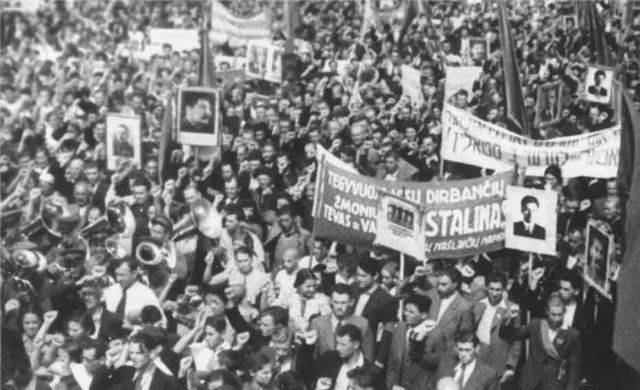
In anti-Soviet journalism, the myth of the "national" resistance of Lithuanians to the establishment of Soviet power traditionally dominates. At the same time, as an example, first of all, the activities of the famous Forest Brothers - the partisan and underground movement in the territory of Lithuania, which began its activities almost immediately after the proclamation of the Lithuanian Soviet Socialist Republic and only a few years after the Victory in the Great Patriotic War, which is suppressed by the Soviet by the troops. Naturally, the inclusion of Lithuania into the Soviet Union was not welcomed by significant sections of the population of the republic. Catholic clergy who received direct instructions from the Vatican, nationalist-minded intelligentsia, yesterday's officers, officials, police of an independent Lithuania, prosperous farmers - they all did not see their future as part of the Soviet state, and therefore were ready to deploy full-fledged resistance to Soviet power immediately after the inclusion of Lithuania in the USSR.
The specifics of the social and political situation in the newly acquired republic were well understood by the Soviet leadership. It was for this purpose that mass deportation of anti-Soviet elements to the deep regions and republics of the USSR was organized. Of course, among the deportees there were many random people who were not Lithuanian nationalists and enemies of the Soviet regime. But when such mass companies are held, this, unfortunately, is inevitable. On the night of June 14 1941, about 34 thousands of people were deported from Lithuania. Nevertheless, the real opponents of the Soviet government were largely able to remain on the territory of the republic - they had long gone underground and were not going to voluntarily go to the exiled echelons.
Lithuanian accomplices of Hitler
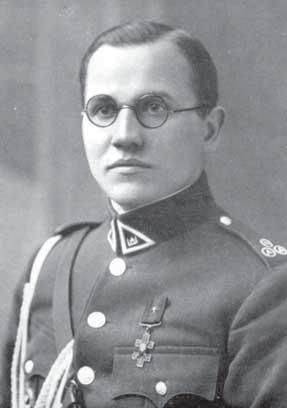 Lithuanian anti-Soviet resistance was actively supported by Hitler's Germany, which hatched plans for an attack on the Soviet Union and hoped to enlist the support of Lithuanian nationalists. Back in October, the Lithuanian Front of Activists, led by the former ambassador of the Republic of Lithuania to Germany, Kazis Skirpa, was established in 1940. Naturally, the position of this person says everything for himself. Kazis Skirpa, a native of the Lithuanian village of Namayunai, lived a long life. He was born in 1895 year, and died in the distant 1979, the last thirty years he lived in the United States of America. When 22 June 1941 of the year Hitlerite Germany attacked the Soviet Union, the Lithuanian front of activists raised an armed anti-Soviet uprising in the territory of the Lithuanian SSR. It began with the killings by Lithuanians who served in local parts of the Red Army, officers - non-members. The 23 of June was formed by the Provisional Government of Lithuania, which was formally headed by Kazis Škirpa, but was actually led by Juozas Ambrazevicius (1903-1974). It was announced the restoration of independence of the Republic of Lithuania. Nationalists began to destroy the Soviet activists - and Russian, and Lithuanians, and people of other nationalities. In Lithuania, mass Jewish pogroms began. It is Lithuanian nationalists who bear the main responsibility for the genocide of the Jewish population in Lithuania during the Nazi occupation. When 24 June 1941 units of the Wehrmacht entered Vilnius and Kaunas, by this time captured by insurgents of the Lithuanian front of activists, the latter managed to carry out bloody Jewish pogroms, whose victims were at least four thousand people.
Lithuanian anti-Soviet resistance was actively supported by Hitler's Germany, which hatched plans for an attack on the Soviet Union and hoped to enlist the support of Lithuanian nationalists. Back in October, the Lithuanian Front of Activists, led by the former ambassador of the Republic of Lithuania to Germany, Kazis Skirpa, was established in 1940. Naturally, the position of this person says everything for himself. Kazis Skirpa, a native of the Lithuanian village of Namayunai, lived a long life. He was born in 1895 year, and died in the distant 1979, the last thirty years he lived in the United States of America. When 22 June 1941 of the year Hitlerite Germany attacked the Soviet Union, the Lithuanian front of activists raised an armed anti-Soviet uprising in the territory of the Lithuanian SSR. It began with the killings by Lithuanians who served in local parts of the Red Army, officers - non-members. The 23 of June was formed by the Provisional Government of Lithuania, which was formally headed by Kazis Škirpa, but was actually led by Juozas Ambrazevicius (1903-1974). It was announced the restoration of independence of the Republic of Lithuania. Nationalists began to destroy the Soviet activists - and Russian, and Lithuanians, and people of other nationalities. In Lithuania, mass Jewish pogroms began. It is Lithuanian nationalists who bear the main responsibility for the genocide of the Jewish population in Lithuania during the Nazi occupation. When 24 June 1941 units of the Wehrmacht entered Vilnius and Kaunas, by this time captured by insurgents of the Lithuanian front of activists, the latter managed to carry out bloody Jewish pogroms, whose victims were at least four thousand people. The provisional government of Lithuania hoped that Germany would help the republic regain its political sovereignty. However, Hitler had completely different plans for Lithuania. The entire region was included in the Reichskommissariat Ostland. In accordance with this decision, the authorities of the “sovereign Lithuanian Republic” created by the Lithuanian front of the activists were dissolved in the same way as the armed formations of the Lithuanian nationalists. A significant part of yesterday’s fiery supporters of Lithuanian independence immediately found their way into the situation and joined the support units of the Wehrmacht and the police. The organization Iron Wolves, once created by former Prime Minister Voldemaras, at the time of the events described was led by a former major of the Lithuanian air force, Jonas Piragus. His subordinates played a major role in the anti-Soviet uprising, and then welcomed the arrival of the Nazis and enlarged the ranks of police units and counterintelligence.
On June X, the Archbishop of the Roman Catholic Church in Lithuania, Joseph Skvirekas, publicly declared his full support from the Catholic clergy of Lithuania for the struggle that the Third Reich was waging with Bolshevism and the Soviet Union. By flirting with the Catholic Church, the German administration of Lithuania allowed the restoration of theological faculties in all universities of the country. However, the Nazis allowed activity in the territory of Lithuania and the Orthodox diocese - with the hope that the priests will influence the sympathies and behavior of the Orthodox population.
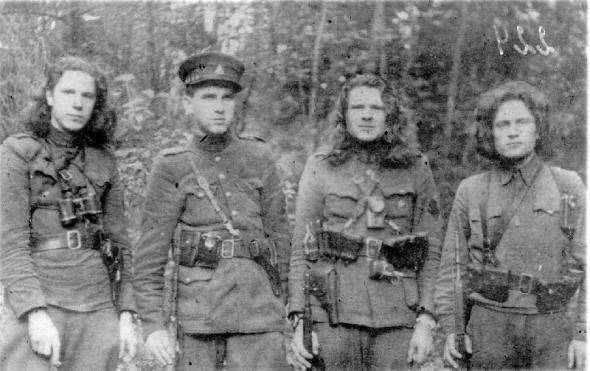
Nazi bloody trail
In November, 1941, under the leadership of the German administration, was transformed into paramilitary Lithuanian self-defense units. At its base was created the Lithuanian auxiliary police. By 1944, the 22 of the Lithuanian police battalion operated, in aggregate there were 8000 people. The battalions served in the territory of Lithuania, the Leningrad region, Ukraine, Belarus, Poland and even used in Europe - in France, Italy and Yugoslavia. Together with 1941 to 1944 in auxiliary police formations served 20 000 Lithuanians. The consequences of the activities of these formations are impressive and terrifying at the same time. Thus, by October 29, 1941, 71 105 of people of Jewish nationality was destroyed, including 18 223 people were massacred in the Kaunas fortress. In May 1942 in Panevezys, Lithuanian policemen shot 48 members of an exposed underground communist organization. The total number of people killed on the territory of Lithuania during the years of the Nazi occupation reaches 700 000 people. 370 000 citizens of the Lithuanian SSR and 230 000 of Soviet prisoners of war, as well as residents of other republics of the USSR and foreign citizens were killed.
To the credit of the Lithuanian people, it should be noted that the overwhelming majority of Lithuanians remained aloof from the fanatics of the nationalists and Nazi collaborators. Many Lithuanians participated in the anti-fascist and partisan movement. 26. November 1942. By the decision of the USSR State Defense Committee, the Lithuanian headquarters of the partisan movement was established under the direction of Antanas Snečkus. On the territory of Lithuania, by the summer of 1944, at least 10 000 guerrillas and members of underground organizations were operating. Partisan organizations included people of all nationalities - Lithuanians, Poles, Russians, Jews, Belarusians. By the end of 1943, 56 groups of Soviet partisans and underground fighters operated in Lithuania. After the war, the number of partisans and underground fighters operating during the Great Patriotic War in Lithuania was established by name. 9187 guerrillas and underground fighters are known, 62% of whom were Lithuanians, 21% Russians, 7,5% Jews, 3,5% Poles, 2% Ukrainians, 2% Belarusians, and 1,5% people of other nationalities.
During the 1944-1945. Soviet troops liberated the territory of the Lithuanian SSR from the Nazi invaders. However, Lithuanian nationalists almost immediately switched to armed struggle against the return of Soviet power. In 1944-1947 the struggle of the “Lithuanian Freedom Army” and other armed formations, often united under the name “Lithuanian Forest Brothers”, was open-ended. Lithuanian nationalists sought to achieve international recognition and received moral support from the United States and Great Britain, which for a long time did not want to recognize the return of Soviet power in the Baltic States. Therefore, Lithuanian nationalists tried to present themselves not as a partisan movement, but as a regular army. They maintained, albeit formally, the structure of the regular army, with military ranks, headquarters, and even their own officers' school, which was later captured during the operation of the Soviet troops. In 1947, the active operations of the Soviet troops and the state security forces forced the Forest Brothers to move from open confrontation to guerrilla warfare and terrorism.
The activity of the “Forest Brothers” is a topic of a separate and interesting research. Suffice it to say that the armed detachments of the Lithuanian nationalists operated on the territory of the republic until the end of the 1950s, and in the 1960s. there were separate forays of the Forest Brothers. During the years of the anti-Soviet terror they unleashed, 25 thousands died at the hands of the so-called “patriots of Lithuania”. 23 thousands of them - ethnic Lithuanians, who were killed (often with children) for cooperation with the Soviet authorities, and even on imaginary suspicions of sympathy for the Communists. In turn, the Soviet troops managed to destroy up to thirty thousand members of the gangs of the "forest brothers". In modern Lithuania, the “forest brothers” are glorified, they are given monuments and are considered to be fighters for the “independence” of the country from the “Soviet occupation”.
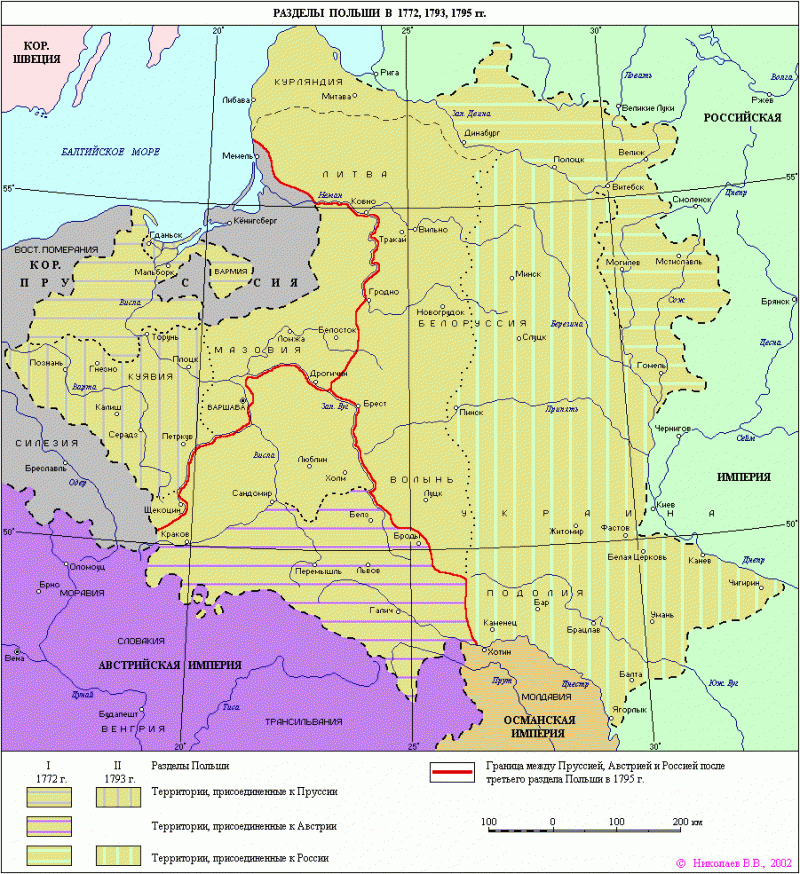
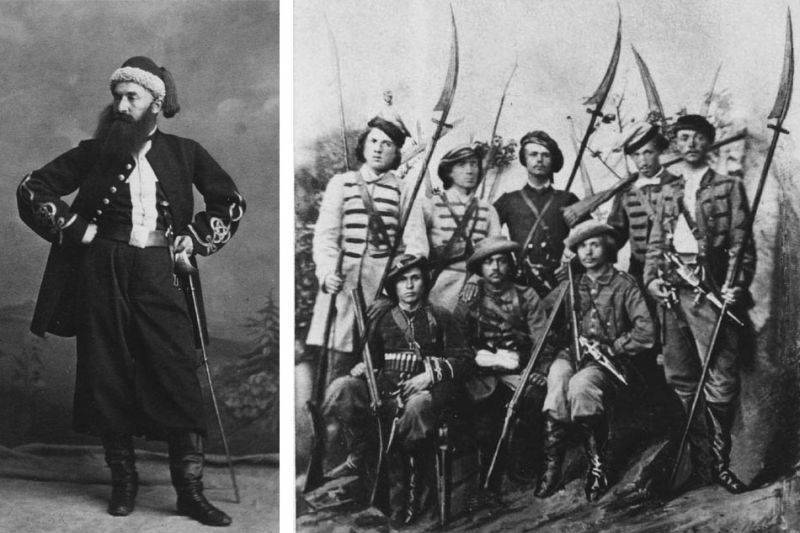
Information